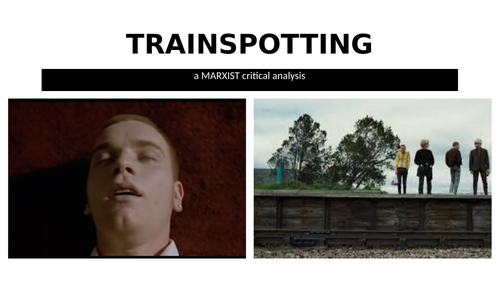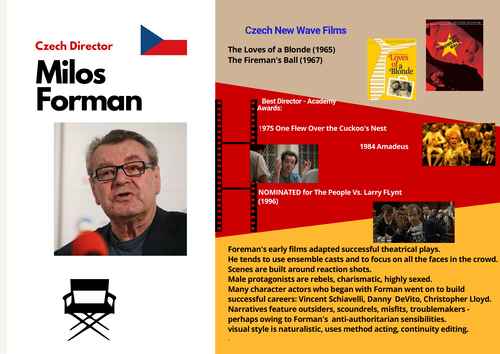56Uploads
12k+Views
2k+Downloads
All resources

'Captain Fantastic' Scene Analysis
For Eduqas A Level Film Studies, this 43-slide full colour interactive presentation prepares students to analyse how cinematography and mise-en-scene are used to convey key narrative meanings. Students are encouraged to question, discuss and share their own thoughts and there is a strong emphasis on uses of cinematic terminology as well as analysis and exam preparation (with a practice exam question).
Sale

Billy Wilder - Auteur Poster
This colourful poster outlines the key ‘signature’ features distinctive of WIlder’s films It makes an attractive classroom display that also provides helpful memory prompts for Eduquas A-Level Film Studies Students who are sitting the Component 1. Exam Paper.

Religious Attitudes to Sex: Christianity & Islam
This full colour 13-slide PowerPoint presentation covers the principle beliefs about sex and its proper context in both the Christian and Islamic faiths.
It provides a good overview for this topic for the GCSE in Religious Studies and works well as a lesson plan if coupled with a revision quiz or practice test question. THe resource ends with two questions that could be used as discussion prompts or retention checks.

Religious Studies: Marriage & the Family
This 30 slide full-colour interactive powerpoint presentation informs students about religious beliefs about marriage and the family. Topics covered include the Muslim and Christian marriage ceremony as well as Civil Partnerships, definitions of marriage, arranged marriages, reasons for marriage, roles in marriage, vows, the nature of families, cohabitation and same-sex marriage.
The resource helps students to prepare for the GCSE Exams in Religious Studies as well as helping students of religious faith to understand the rite of marraige and how religions and non-religious people view it.
The resource offers lots of discussion prompts to encourage class discussion.
This resource could be used as a two-hour lesson.

British Film Since 1995 (Eduqas A Level Film Studies Revision)
This 30 full colour , interactive PowerPoint Presentation is the ideal revision tool to prepare students for the A-Level Film Studies exam paper (Component 1C.).
THe two films refrenced are Trarispotting (Boyle, 1996) and Fish Tank (Arnold, 2009).
The resource closely follows the Eduqas Examination Board’s advice and guidance on how to approach ideologies. There are example questions from past papers, discussion prompts and class exercises as well as an essay structure scaffold.
This could be used on conjunction with the two films to teach ideologies and narrative, and provides example binary analyses - a tool for ideological analysis that is transferable to any narrative.

Eduqas A-Level Film: Taxi Tehran (Contextual Study)
This full color, animated, interactive PowerPoint Presentation includes 49 slides with detailed discussion of context for the 2015 film. The context closely follows the Lisa Wardle Textbook to prepare A Level film studies students for the Component 2A. examination question. There are practice questions, exercises, and discussion prompts to get students involved in an interactive lesson. The resource should cover a full two hour lesson.
In addition this resource can be used for a contemporary cultural study of life in Iran. Panahi is an internationally celebrated director whose work (including Taxi Tehran) has won critical acclaim and major awards. This film offers a “way in” to Iran including its theocratic regime, its history and its artistic culture.
Themes explored: Women in Iran, Ethnicity, Representations of generational differences, history, crime & punishment, political dissent and its consequences and the nature of filmmaking itself.

TIMBUKTU - a film by Abderrahmane Sissako (2014)
This 40-slide full colour Power Point Presentation allows for a diverse range of topics to be studied. It covers history, culture, religious themes and filmmaking/media studies.
The film is about the destruction of culture and heritage, as well as occupation/colonialism, religious freedom, and human rights. The presentation also focuses on the film and its production, including representations and issues addressed by the filmmaker.
The film was produced to include the languages of the region in which it is set, including French, Tamasheq, English and other African dialects.
This resource facilitates rich discussion on topics such as: historical events, religious law, the value of cultural preservation and women’s rights.
It is appropriate for students aged 16 - 18. The violence of some events could be triggering for younger years.

Sisters in Law (Documentary) Close Study
This 37 full colour slide presentation provides an overview of the issues and filmmaking practices deployed in the production of Sisters in Law, a documentary by British filmmaker Kim Longinotto and Cameroonian filmmaker Florence Ayisi. The lesson revolves around the cinema verite practices used, transnational feminism, ‘post-feminism’ and its clichés, issues of representation, and the struggle for women’s rights within societies that are culturally mixed and traditionally patriarchal. Although these are complex issues, the resource is aimed at an A-Level (Year 12 / 13) learner, following the EDUQAS Film Studies Curriculum.
For this reason, there is focus on the filmmaking practices used as well as the human rights issues within the documentary. The presentation ends with an exam question from the Eduqas A Level Film Studies Specification, so that film studies students can apply the learning from the presentation. However, this resource could also form an interesting resource for social studies, media studies or African cultural studies. The human rights issues make this a widely applicable resource that could be useful across a variety of subjects. The content should fill a two-hour lesson and provides ample scope for class discussions and (for A-Level FIlm Students) exam practice.
Sale

Moonlight - A Level Film Studies EXAM FOCUS
This 25 slide full colour PowerPoint Presentation provides helpful exam preparation for ideology and spectatorship (Eduqas Film Studies Component 1B.). The resource is closely focused on what examiners will expect, and offers talking points, discussion questions, and commentary on core study areas and representation.

A Marxist Analysis of TRAINSPOTTING
This 35-slide PowerPoint Presentation can be used for the ‘ideologies’ study of Trainspotting for the Eduqas A Level Film Studies Component 1C. (British Films).
It provides a full interactive 2 hour lesson plan with focus on exams. Marxist ideology is introduced gently with a few key concepts including: class struggle, alienation, exploitation, consumerism, commodity fetishisaton and false consciousness.
Marxist concepts are applied to particular aspects of the film’s mise-en-scene and to particular sequences. Issues are explored through discussion with lots of question prompts to allow discussion and debate.

Captain Fantastic: Ideology & Spectatorship
This is a 27 slide interactive PowerPoint to prepare pupils for the Eduqas A Level Film Studies, Component 1B. exam.
Ideology and Spectatorship are explored and applied to the film Captain Fantastic (Ross, 2016) with lots of questions for pupils to ponder and discuss throughout.
Helpful ‘talking points’ about how to interpret the ideological positioning of the Cash family.
Theory: Laura Mulvey’s ‘male gaze’ is touched on as is Stuart Hall’s reception theory. The presentation is designed to provide two-hour lesson plan.

Identity in Trainspotting
This is a 50 slide full colour PowerPoint Presentation on national identity versus British identity (as well as multicultural, globalized Britain) in the 1996 film Trainspotting (Danny Boyle).
This is very useful for** EDUQAS A Level Film Studies** because of the focus on representations in the film, including how particular aspects of **mise-en-scene **link to identity, narrative themes and character.
This presentation can be used to study the film’s binary oppositions and how Scotland and London come to represent different outlooks, rather than just different geographical locations.

Scottish Identity in TRAINSPOTTING
This study of the 1996 film TRAINSPOTTING by Danny Boyle explores how Scottish identity and culture are represented in the film.
This is a 46 Slide PowerPoint Presentation and it comprises sufficient material for a comprehensive lesson plan. This is useful for media studies, film studies and cultural studies. The resource explores how stereotypes, identity and representations are constructed in a media text.

Trainspotting - Ideologies
For the** EDUQAS Film Studies A Level** Component 1C. British Films, this resource provides a great exam revision preparation lesson. This is a 24 slide PowerPoint including interactive activities that allow students to reflect on ideological meanings and to share their ideas.
The resource is focused on the EDUQAS A Level examination, and includes past questions to guide pupils in how to craft good answers targeted on ideological analysis. Includes key prompts and talking points for ideology and a sample binary analysis.

Milos Forman Auteur Director Poster
This full colour poster outlines Czech-American film director Milos Forman’s key directorial attributes and achievements.
Perfect for the Auteur study question on the Eduqas Film Studies A-Level curriculum.

One Flew Over the Cuckoo's Nest - Close Analysis
This Resource is a 44 Slide interactive PowerPoint Presentation offering students a lot of room for discussion and debate around the identity politics within the film, as well a the contextual issues that would have influenced the narrative and the filmmakers (as well as the novelist).
Students are encouraged to reflect and to discuss, activities get them involved in dissecting the film’s meanings - both literal and subtextual.
Perfect revision for the Eduqas A-Level Film Studies Component 1A. Paper.
https://resource.download.wjec.co.uk/vtc/2017-18/17-18_3-7/eng/sam2-component-1.pdf
Sale

EDUQAS A Level Film Studies - Gender in Some Like It Hot
This 25 Slide PowerPoint Presentation can be used for an hour long lesson on gender representations in Billy Wilder’s 1959 film ‘Some Like It Hot’. This can be used for the Component 1A. American Film Exam preparation in Film Studies, or it could be useful in AS Film Studies or Media Studies to discuss gender transgression, homoerotic subtext and feminist themes or messages in the film.
The film challenges gender binaries and stereotypes and cleverly uses subtext and indirect or double meanings to get across its progressive messages in subtle ways that would not have alienated 1950’s American audiences.
This is an interactive presentation that ends with a 15 minute exercise.

Winter's Bone Ideology Graphic
This Graphic provides an overview of the key ideological issues for the film Winter’s Bone. There are other possibilities for the A-Level Film Studies Exam (such as gender or class) but this graphic provides possibly the best understanding of the more subtle political ideologies within the narrative and their contexts than the more ‘identity’ based approach to ideology.
This graphic places the film within its concurrent social and political contexts, and these bear upon how the film will be** ‘de-coded’** (vis. Stuart Hall’s theory) by viewers, depending upon the background knowledge they bring to their viewing experience. Therefore, this resource provides possibilities for** spectatorship issues** as well as ideology.
Bundle

Religious Studies Bundle
This bundle contains three colorful, interactive PowerPoint Presentations that can be used for full lessons on religious beliefs about a variety of topics, including: human rights, social justice, law, secularism, crime and punishment.
It references both Christianity and Islam and can be used to broaden discussion to more philosophical questions such as:
What is the relationship bewteen religious concepts of justice and society’s laws?
Which is the best reason / purpose for punishment?
Why do liberals believe that morality is a private matter?

Religious Versus Secular Laws
This 38 full color **interactive **slide presentation can be used to teach many concepts pertaining to religion and society. It explains the relationship between modern states (primarily the United States and Great Britain) and religions (with focus on Christianity & Islam). Concepts such as secularism, liberalism, theocracy and apostasy are included. Religious teachings are used and analysed, so that students are taught to demonstrate knowledge of **religious approaches to law **as well as applications and analysis. Exam practice questions are provided as well as guidance on how to answer them.
This is also useful for citizenship and cultural studies courses.




















